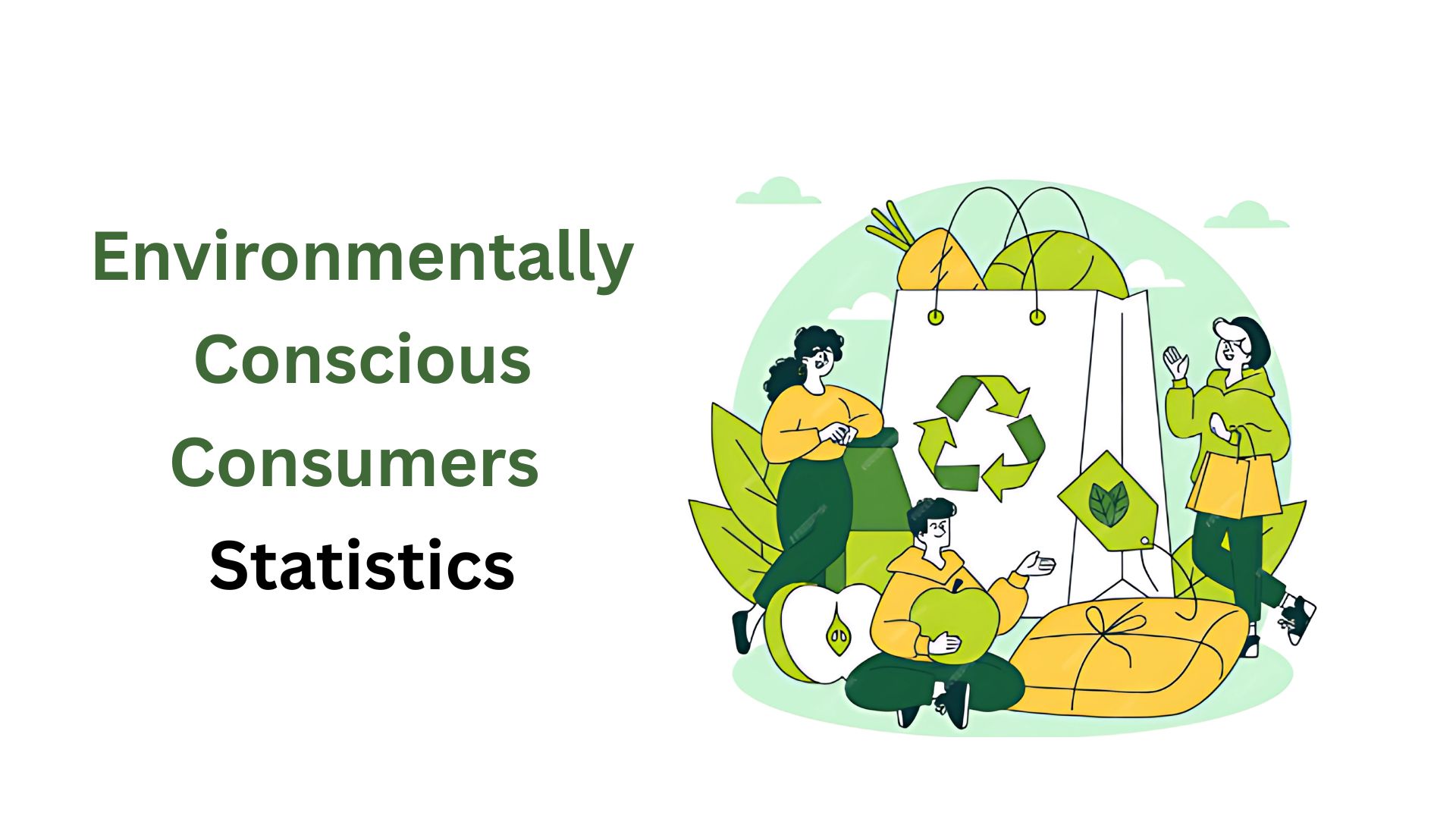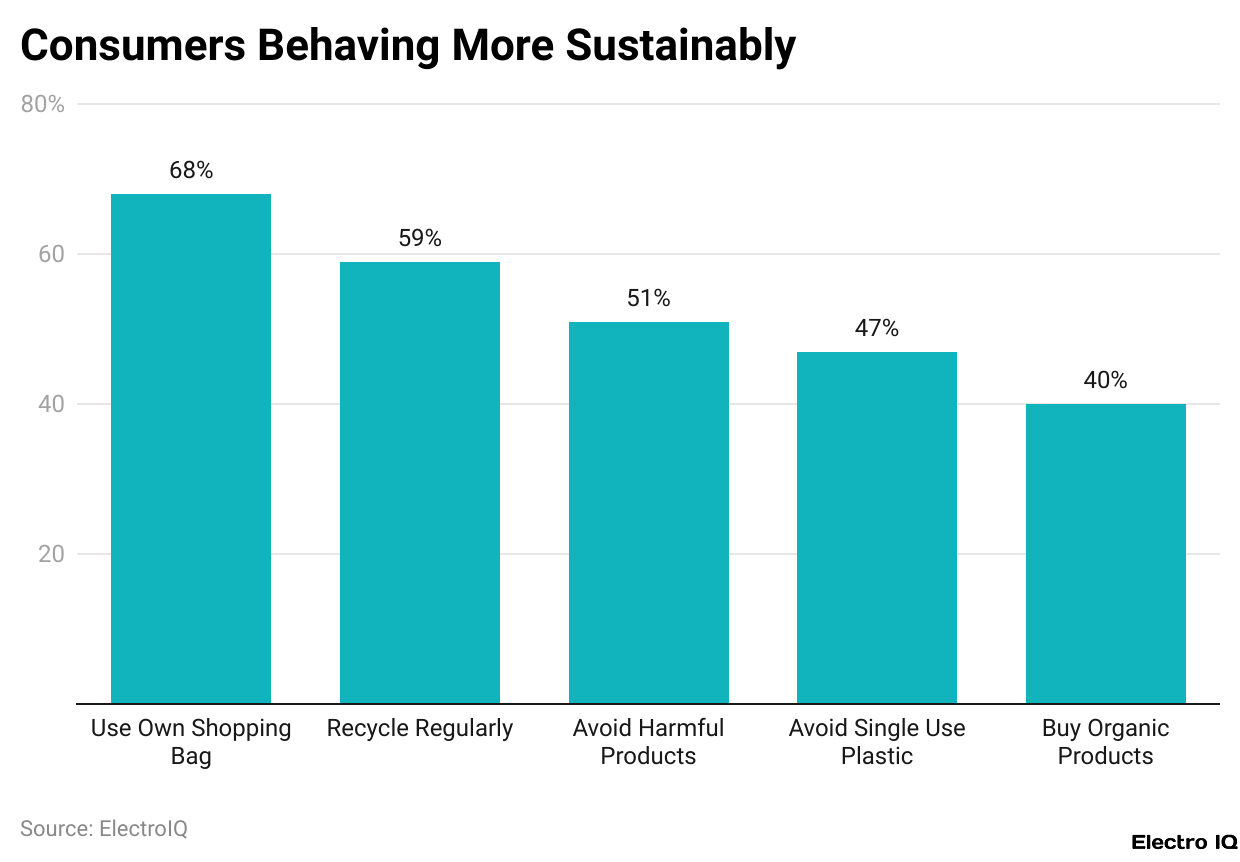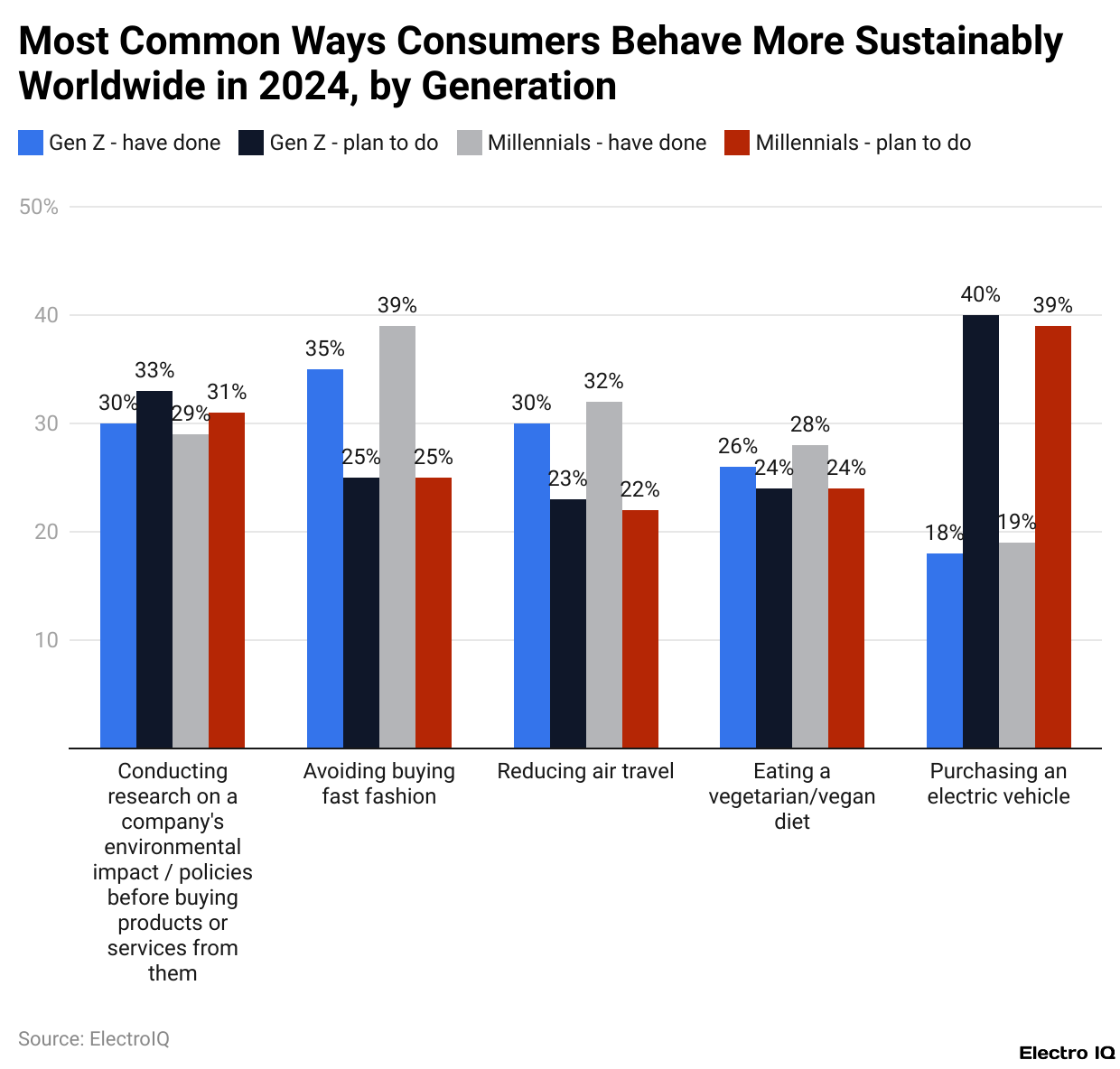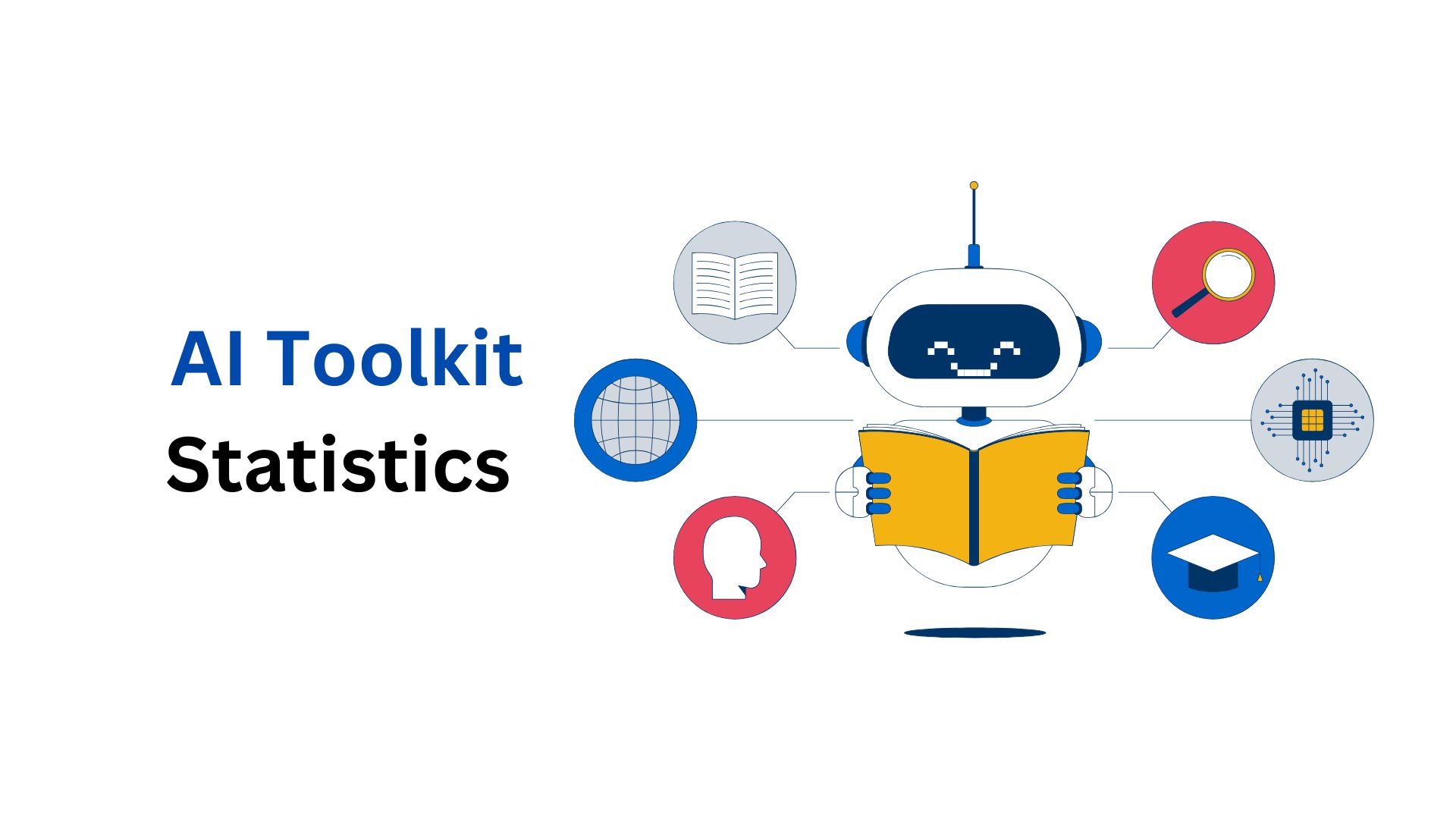Environmentally Conscious Consumers Statistics And Facts (2025)
Updated · Oct 22, 2025

Table of Contents
- Introduction
- Editor’s Choice
- Consumer Behaviour Towards Sustainability
- Leading Ways Consumers Behave More Sustainably Worldwide In 2024, By Generation
- How Economic Pressures Are Driving Sustainable Consumer Behaviour
- Poor Environmental And Ethical Practices Drive Customers Away
- Growing Demand And Willingness To Pay For Eco-Friendly Products In The U.S.
- The Impact of Sustainability Messaging On Brand Trust And Consumer Behaviour
- Conclusion
Introduction
Environmentally Conscious Consumers Statistics: In a remarkable transformation that took the year 2024 by storm, environmental consciousness grew amidst consumer awareness and appreciation. Purchasing decisions of more and more people are now based on the sustainability, ethical production, and environmental impact of a consumer product.
Businesses are now having to answer to this new breed of environmentally conscious consumer, as climate change and environmental issues dominate the global discourse. Consumers demand biodegradable packaging from businesses, while supporting carbon-neutral brands, and steer the future of commerce.
In this article, the latest numbers of 2024 regarding environmentally conscious consumers statistics are studied, using actual data to shed light on the transformation of consumer behaviour toward green ecology.
Editor’s Choice
- 68% of people now bring their reusable shopping bags; 59% recycle regularly; 51% avoid harmful products; 47% refuse single-use plastic; and 40% buy organic or natural products.
- The global average of around 30% of Gen Z consumers avoided purchasing fast fashion in 2024 as a way to apply pressure for climate action on brands, and another third planned on doing so.
- Globally, 24% feel food waste is a major concern, with 80% properly storing food, 70% cooking with leftovers, and 64% engaging in meal planning.
- Carbon-neutral products have been frequently bought by only 8%, mainly due to a lack of awareness (24%) or availability (27%). However, 72% have occasionally or frequently opted for 100% recyclable packaging.
- High cost is cited by 60.9% of world consumers as the barrier to sustainable consumption.
- 84% would stop supporting a brand with poor environmental records; in the same vein, 83% detest unsustainable packaging; 82% reject poor compliance, unethical sourcing, and human rights violations.
- In 2022, 72% of consumers in the U.S. considered environmental impact in the process of shopping, while 48% refrained from new purchases to support sustainability.
- In 2023, U.S. consumers splurged a whopping US$199 billion on sustainable products, thereby accounting for 19.0% of retail spending by 2024.
- Eco-conscious consumers paid 27.6% more for green products in 2022, with the increase in willingness to pay 7.64% in a year.
- Half of worldwide consumers feel sustainability affects brand trust, while 48% consider it crucial for brand recommendation, though only 30% say it plays a part in purchase or buying decisions.
- About 79% of consumers who come across sustainability communication from brands say they trust these messages, despite the existing concerns about greenwashing.
Consumer Behaviour Towards Sustainability

(Reference: theroundup.org)
- As per The Roundup, environmentally conscious consumers’ statistics show that starting in 2021, sustainable actions in the consumer culture saw an uptrend. More and more consumers are utilising Greener options in their mundane lives.
- At present, 68% of consumers walk into the market with their reusable shopping bags whilst foregoing the disposable polybag.
- Perhaps about 59% of individuals make efforts to recycle regularly, and this shows a growing engagement in waste management.
- About 51% of patrons are actively refusing to buy goods they know to be detrimental to the environment. In an attempt to cut down on plastic waste, 47% of people try to stay away from single-use plastics.
- Meanwhile, 40% favour purchasing organic or natural detergents, which are generally considered better options, fitp_talent index=”67″ for health and the planet. Such figures hint at a bigger cultural shift that accommodates sustainable living.
Leading Ways Consumers Behave More Sustainably Worldwide In 2024, By Generation

(Reference: statista.com)
- In 2024, a survey conducted worldwide on environmentally conscious consumers statistics showed that roughly 30% of Gen Z consumers abstained from purchasing fast fashion as a way of pressuring companies to take genuine steps against climate change.
- This implies that a good number of young shoppers are wielding their purchasing power to send a message about environmental responsibility.
- Additionally, about one-third of Gen Z respondents intended to start avoiding fast fashion very shortly for this reason.
- Such a trend is representative of the growing awareness being put forth by younger consumers who are consciously working to ensure that their shopping habits align with their values on environmental issues, problems, and fast fashion.
How Economic Pressures Are Driving Sustainable Consumer Behaviour
- The current cost-of-living crises have, perhaps inadvertently, brought a sustenance-bias toward environmental consciousness.
- The logic is quite straightforward: with affordability moving to centre stage, many have decided to choose second-hand apparel to limit waste and overproduction. Then, with food waste becoming a growing concern, 24% of respondents worldwide indicate it as among the biggest issues.
- Consumers are responding to this concern with practical approaches to curb waste, including storing food (80%), cooking from leftovers (70%), meal planning (64%), preparing detailed shopping lists (62%), and recycling food that is about to go off (55%).
- It is heartening to see such behavioural changes; however, the larger sustainability concepts elude most consumers.
- Only 8% often look for carbon-neutral products, citing reasons mostly being unawareness (24%) or lack of availability (27%).
- Opposite to this, such consumers esteem recyclable packaging as one of their top priorities, with 72% indicating that they frequently or sometimes choose products with fully recyclable packaging.
- High price is the greatest obstacle to sustainable consumption, with that barrier ranking tall among constraints for 60.9% of consumers in the world.
Poor Environmental And Ethical Practices Drive Customers Away
- A consumer’s affinity toward one brand or another can be influenced by any number of factors, such as price, quality, or convenience; however, a label’s bad environmental and ethical record can be a deal-breaker.
- Increasingly, consumers are actively choosing not to patronise brands they find to be irresponsible when it comes to sustainability or ethical behaviour.
- A bad environmental track record will turn away 84% of the most harmful form of accusation.
- The next worst offence is unsustainable packaging: 83% of consumers would be turned off by it.
- Next come poor compliance records (82%), irresponsible sourcing of materials (82%), and poor human-rights records (82%).
- Consumers nowadays are aware of the environmental and ethical issues and are using this awareness to influence their buying decisions. If a brand fails to observe this new expectation, it may risk losing customer confidence and loyalty.
Growing Demand And Willingness To Pay For Eco-Friendly Products In The U.S.
- Sustainability has shifted into a prime client behaviour driver in the United States. In 2022, about 72% of shoppers stated that consideration of a product’s environmental impact is critical in their purchasing decisions.
- That same year, almost half, at 48%, were avoiding buying new things as an attempt to live more sustainably, suggesting an evolution in the conscious consumption paradigm.
- Green-minded consumers have their say in retail shopping; in fact, about 75% of shoppers choose to shop online in most product categories for greener selections. This has helped a growing trend of digital shopping with a sustainable focus.
- In reality, the market for the green-labelled goods is continuing to flourish. The U.S. consumer spending on products labelled as sustainable was US$199 billion in 2023.
- These products were 19.0% of all consumer retail spending by 2024, with consistent growth in demand. Not only are many shoppers weighing sustainability in their purchase decisions, but they’re also willing to pay a bit more for it.
- In 2022, for instance, consumers paid on average 27.6% more for eco-friendly products than for conventional alternatives.
- Furthermore, the share of U.S. consumers willing to pay extra for green alternatives rose by 7.64% over a single year, showing an upward trajectory in the avenue of awareness to take action on the environment.
The Impact of Sustainability Messaging On Brand Trust And Consumer Behaviour
- Trust in sustainability plays a pivotal role in consumers’ purchases, even though it is not always a trigger for the consumption act itself.
- 50% of consumers around the globe say that environmental efforts, cutting carbon emissions, using recycled raw materials, or reducing plastic waste always affect whether they trust a brand.
- It is also a factor for 48% of respondents in deciding whether to recommend a brand to others.
- However, when it comes to actual purchasing behaviour, only 30% of consumers report that sustainability commitments determine whether they buy from a company. But the reality is different in purchase behaviour, and only 30% of consumers state whether sustainability commitments factor into their buying choice from a company.
- Despite all the efforts from brands to preach sustainability, a large chunk of consumers today either don’t see their message or neglect it.
- Consumers under the age of 30, for example, constitute that segment of consumers that is more aware of and influenced by these promotional messages. Still, even among this group, only about 50% of consumers globally want to say they have seen or been impacted by sustainability communications.
- An age gap can be seen in fashion-business-related communications: 61% of consumers under 30 have seen messaging from environmentally friendly clothing brands, compared to 45% of the older generation.
- Ironically, greenwashing-the great enemy branding concept included by environmental organisations- does not seem to be widely feared by consumers anyway.
- Among those who have been exposed to sustainability messaging from brands, a whopping 79% say they are likely to believe what the brand claims.
- This matters because, almost always, sustainability does not translate into purchase, yet consumer perception has an enormous effect on brand values and consumer loyalty.
Conclusion
Environmentally Conscious Consumers Statistics: In 2024, the eco-friendly consumers are no longer a niche—they are a powerful force, shaping global commerce. From Gen Z’s unwavering support for planet-first brands to increased advocacy for transparency and third-party certification, a whole lot of people want to spend their money per value.
Businesses need to step aside from greenwashing and put forward real, tangible sustainability. Those who listen to their green-conscious customers and maintain integrity will be selling in the new age of ethical commerce.
FAQ.
Sustainability has come to be increasingly mainstream. In 2024, 68% of the people will carry reusable shopping bags, 59% will be regular recyclers, 51% will steer clear of harmful kinds of products, while 47% will actively avoid plastics that are single-use. Others who take part in this growing shift towards an eco-friendly lifestyle are 40% opting for organic or natural products.
Gen Z is promoting the environment. Approximately 30% of Gen Z consumers worldwide have stopped purchasing from fast fashion lines to coerce the industry into climate change action, and another third plan to do that soon. The interests of their purchasing decisions have gradually swung towards ecological and ethical values.
First, the biggest barrier is price; 60.9% of consumers worldwide said they could not afford the more environmentally friendly option. Another barrier is the fact that the idea of sustainability is still a confusing concept; only 8% of consumers globally said they frequently purchase carbon-neutral products, with 24% saying it is due to a lack of awareness, and 27% saying it is due to a lack of availability.
Environmental and ethical misdemeanours typically alienate brand loyalty. In 2024, 84% of consumers said they would stop supporting a brand with a poor environmental record. Other compelling reasons are unsustainable packaging (83%), poor compliance (82%), and unethical sourcing (82%), followed by human rights violations (82%).
They do. In 2022, the consumers in America paid an average of 27.6% more for an eco-friendly product. By 2024, such sustainable products made up 19.0% of the total U.S. retail expenditure. Further emphasis on this fact is raised by the fact that 7.64% more consumers within one year are willing to spend more on sustainable production, which marks the increasing support for green alternatives.

Maitrayee Dey has a background in Electrical Engineering and has worked in various technical roles before transitioning to writing. Specializing in technology and Artificial Intelligence, she has served as an Academic Research Analyst and Freelance Writer, particularly focusing on education and healthcare in Australia. Maitrayee's lifelong passions for writing and painting led her to pursue a full-time writing career. She is also the creator of a cooking YouTube channel, where she shares her culinary adventures. At Smartphone Thoughts, Maitrayee brings her expertise in technology to provide in-depth smartphone reviews and app-related statistics, making complex topics easy to understand for all readers.










